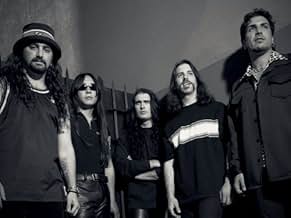Metal Evolution
- Série de TV
- 2011–2014
AVALIAÇÃO DA IMDb
8,5/10
2,8 mil
SUA AVALIAÇÃO
Adicionar um enredo no seu idiomaA journey through heavy metal's roots and evolution, featuring interviews with rock legends and industry insiders. Myths are challenged as the genre's depth and impact are revealed through c... Ler tudoA journey through heavy metal's roots and evolution, featuring interviews with rock legends and industry insiders. Myths are challenged as the genre's depth and impact are revealed through candid talks with stars from iconic bands.A journey through heavy metal's roots and evolution, featuring interviews with rock legends and industry insiders. Myths are challenged as the genre's depth and impact are revealed through candid talks with stars from iconic bands.
- Prêmios
- 1 indicação no total
Explorar episódios
Avaliações em destaque
Canuck head banger Sam Dunn examines the evolution of heavy metal from the same anthropological viewpoint as his "Metal" documentary films. Metal Evolution is more of the same globe-trotting adventures of Dunn and crew as they examine the origins of the beast from the smoking cauldrons of Birmingham to the back streets of New York in the 1970s.
Dunn plays to his audience and those uninterested in metal might not really enjoy such a detailed examination of the various sub-genres of metal. For those who are more denim and leather inclined, metal evolution provides a treasure trove of interviews with such "metal gods" as Rob Halford, Geezer Butler, and even such "proto-punk"(I hate that term) legends as Iggy Pop. Dunn is entirely methodical in his examination of the genre, and this is clearly a labour (yes I am Canadian, that is a U) of love for Dunn.
What is truly great about Metal Evolution is the sheer grandiosity of the examination. Every major sub-genre is covered (Yes, even the much maligned "Nu-Metal"). If the words "Black Metal, Death Metal, and Power Metal" don't strike any chords in your hardened heart, then Metal Evolution will probably not be worth your time. I truly loved every minute of this series so far, and it is great to see such a documentary in the era of "bands" (I use the term loosely) such as LMFAO and Hedley who are about as heavy as non-alcoholic Labatt's. Yes, Metal (CAPITAL!!!) is back and Dunn's examination proves once and for all that metal is not for the weak, nor is it for the unenlightened. Dunn, a University Graduate and scholar proves that metal is an intensely complex genre full of musical diversity and a list of "characters" that are equally complex. Overall, an absolute must for anyone who has been known to throw up the horns in salute to the world's most misunderstood form of music. METTTTTTTAALLLLLLLLLLLL!!!!!!!
Dunn plays to his audience and those uninterested in metal might not really enjoy such a detailed examination of the various sub-genres of metal. For those who are more denim and leather inclined, metal evolution provides a treasure trove of interviews with such "metal gods" as Rob Halford, Geezer Butler, and even such "proto-punk"(I hate that term) legends as Iggy Pop. Dunn is entirely methodical in his examination of the genre, and this is clearly a labour (yes I am Canadian, that is a U) of love for Dunn.
What is truly great about Metal Evolution is the sheer grandiosity of the examination. Every major sub-genre is covered (Yes, even the much maligned "Nu-Metal"). If the words "Black Metal, Death Metal, and Power Metal" don't strike any chords in your hardened heart, then Metal Evolution will probably not be worth your time. I truly loved every minute of this series so far, and it is great to see such a documentary in the era of "bands" (I use the term loosely) such as LMFAO and Hedley who are about as heavy as non-alcoholic Labatt's. Yes, Metal (CAPITAL!!!) is back and Dunn's examination proves once and for all that metal is not for the weak, nor is it for the unenlightened. Dunn, a University Graduate and scholar proves that metal is an intensely complex genre full of musical diversity and a list of "characters" that are equally complex. Overall, an absolute must for anyone who has been known to throw up the horns in salute to the world's most misunderstood form of music. METTTTTTTAALLLLLLLLLLLL!!!!!!!
I first heard of "Metal Evolution" when creator, and narrator, Sam Dunn went on VH1's "That Metal Show" to talk about the series. As I am always interested to hear new music, especially older bands that I had overlooked, I tuned in and instantly got more than I bargained for. Dunn crafts the show so that you get a current view of a metal sub-genre along with it's past and it's influences. Often I would leave an episode with a list of 5-6 bands that I had never heard of (or never cared to listen to) and would immediately be happy as I worked through new set lists on Spotify.
Best of all, this show not only appealed to myself (self-professed metal head), but my wife who wants nothing to do with heavy metal music. While my wife won't be picking up any of the new bands from the show, she was interested in the evolution of the music and seeing how current metal music tied back to bands that she was already aware of. While there are some episodes that I particularly didn't care for (grunge / nu-metal) I still found the shows to be extremely interesting.
Best of all, this show not only appealed to myself (self-professed metal head), but my wife who wants nothing to do with heavy metal music. While my wife won't be picking up any of the new bands from the show, she was interested in the evolution of the music and seeing how current metal music tied back to bands that she was already aware of. While there are some episodes that I particularly didn't care for (grunge / nu-metal) I still found the shows to be extremely interesting.
If you are a fan of metal in any kind - YOU MUST SEE THIS. However, it is interesting for people that don't even like metal music. My sister is not a fan but, she's almost more into this show than I am. I love metal and I love the fact that this show explores all the different genres. I hate the fact that people that don't like metal think it's all just violence and anger. For some bands it is but, however, there are so many different forms of metal that some people would even be surprised to learn that certain bands are even considered metal. The cool thing about this show is that even if there is a band that I absolutely hate on it, it's equally as interesting and entertaining when there's a band I love. This is one the greatest shows on TV right now and I hope that it can open at least one person's eyes to what metal really is.
I thought the show was interesting and am sometimes shocked at how some of the performers, such as Metallica and Slayer, seem to be oh so very human during their interviews. The origins of metal, according to the show, developed during the Elvis Presley era. Which, I think is a bit far fetched. To me, the first heavy metal song was Helter Skelter by the Beatles. I also never considered bands like Nirvana and Pearl Jam having anything to do with metal. I always considered them more on the lines of punk rock. I thought the documentary was well done. Bringing up bands like Blue Cheer was great, because I had always thought they never got their due. All in all, it's still Rock and Roll to me.
This is just a general overview of the entire series. The 1000-word limit makes it near-impossible for me to cover all 11 episodes in a satisfactory manner. So, if you have nothing better to do, look up my reviews on the individual episodes to get a more detailed appraisal of Dunn's ambitious little project.
Sam Dunn. The best thing about him is his short name; it doesn't take a long time to write. I have issues though with the way he presents the development of metal and its branches. A typical Sociology Major, Dunn thinks that human environment is at the root of EVERY change, whether in music or generally. Hence this naive/deluded need to over-focus on "teen angst" and "alienated youth rebellion". Well, "angry teens" had existed 50 years ago, too, 5000 years ago; they were always around. Metal developed only recently mainly due to technology: it's that simple. But Sociologists are notorious for talking about the bleedin'-obvious - as well as missing the bloody obvious.
The episodes are too short. 45 minutes isn't enough to cover any of these branches – not even the awful ones such as nu-metal and power metal. However, that probably wasn't Dunn's fault; I assume it's the time-framework within which he had to work. He is to blame though for wasting some of that precious limited screen-time by inserting interviews with quasi-experts/outsiders who have either nothing interesting to say or who can't even get basic facts straight.
For example, interviewing a Marxist college-professor who actually argued that Metallica sold out on the "black album" because they recorded ballads for it. Never did it occur to her to actually PLAY their albums; that way she would've learned that Metallica had recorded ballads on three previous albums. In the same episode, an author of a book ironically titled "Extreme Metal" tells us in all seriousness that "death metal completely abandoned all melodies". So how does that help in making me believe that he is a go-to person for extreme metal? Farcical.
Dunn's over-zealousness to lend the series "credibility"/seriousness – by interviewing pseudo-intellectuals (i.e. those who conned him into believing they were part of the "all-knowing", highly analytical intelligentsia) who know next-to-nothing about metal but act as if they have all the answers – is annoying. Contrary to popular opinion, there actually are intelligent, knowledgeable, and fascinating characters in the metal scene itself: there is NEVER need for metal documentary-makers to go for "outside help" in explaining the genre. 1: most metal fans don't want to listen to these attention-seeking "experts" with their long-winded, far-fetched and nebulous theories on metal's "social relevance". 2: the uninitiated will be mislead by listening to so-called "experts" who prefer to let their imaginations run wild, making up nonsense about the meaning/origins of metal, as opposed to looking at the genre in a realistic, down-to-Earth manner. Besides, I'd rather hear about it from the horse's mouth than listen to the views of people who obtained most of their limited knowledge second-hand or even third-hand.
The most irritating aspect of the series is metal's oft-touted "socio-political relevance". There are even some fools who claim that metal was created by youths reacting against the status quo, the so-called "Establishment" (i.e. the same society that enabled their freedom to explore music in such an adventurous manner in the first place) – and we all know what is really meant by this: kids from the "proletariat" rejecting the vicious, "decadent" Capitalism that oppressed them so; a romantic notion, but far-removed from the truth. Besides, it is mind-bogglingly hypocritical that these Western Communists actually suggest that metal kids look toward Marxism as some sort of "bastion of hope and freedom"; in those countries metal-heads usually had a hard time even finding/buying metal albums, let alone being able to pursue careers with their own bands. Socialism as the "Great Youth Liberator"? You've got to be kidding me.
The emergence of metal and its subsequent and speedy evolution had mainly to do with the huge/rapid leaps in music equipment. Or would anyone suggest that metal could have just as easily started in the early 1900s? Before Christ? The reason why it became increasingly heavier, with thrash starting off a long chain of extreme sub-genres, is the technology: continually improving guitars/amps/pedals. Without an improvement in the gear since the early 70s there would have been most likely no thrash, and certainly no industrial or death metal, both of which heavily rely on high-quality productions/sounds to avoid sounding like unlistenable noise. (Pop fans might beg to differ.) Especially thrash had little to do with "alienation" or any such baloney which left-wing rock analysts want to believe in so very much because that would back up their own misogynist worldview.
Metal bands – those few that are overtly political - may generally tend to lean toward left-wing politics (as nearly all forms of rock), but there are too many non-liberal – key – figures in metal for Marxists to be able to claim metal as the natural extension of their decadent ideology, or to be able to misuse metal as an extended arm of their powerful world-wide media propaganda. Alice Cooper, Lemmy, Hetfield, Nugent, Peart, Simmons, Kerry King, Pete Steele, Mustaine: just some of the big names that are well-known for not being liberals.
I am disappointed at how Dunn managed to omit some key bands in certain episodes. His coverage of thrash was quite solid (you can't make a bad episode about it if you tried), but even there he blundered by omitting Venom, Voivod (wearing their T-shirt doesn't cut it), the German trio, SYL, Machine Head and Grip Inc, while actually wasting the viewer's time with later mediocre garbage such as In Flames, At the Gates, etc.
Given its flaws, such as the superficiality that stems from overly compressed/crammed info, the series is of more use to those clueless about metal than to fans.
Sam Dunn. The best thing about him is his short name; it doesn't take a long time to write. I have issues though with the way he presents the development of metal and its branches. A typical Sociology Major, Dunn thinks that human environment is at the root of EVERY change, whether in music or generally. Hence this naive/deluded need to over-focus on "teen angst" and "alienated youth rebellion". Well, "angry teens" had existed 50 years ago, too, 5000 years ago; they were always around. Metal developed only recently mainly due to technology: it's that simple. But Sociologists are notorious for talking about the bleedin'-obvious - as well as missing the bloody obvious.
The episodes are too short. 45 minutes isn't enough to cover any of these branches – not even the awful ones such as nu-metal and power metal. However, that probably wasn't Dunn's fault; I assume it's the time-framework within which he had to work. He is to blame though for wasting some of that precious limited screen-time by inserting interviews with quasi-experts/outsiders who have either nothing interesting to say or who can't even get basic facts straight.
For example, interviewing a Marxist college-professor who actually argued that Metallica sold out on the "black album" because they recorded ballads for it. Never did it occur to her to actually PLAY their albums; that way she would've learned that Metallica had recorded ballads on three previous albums. In the same episode, an author of a book ironically titled "Extreme Metal" tells us in all seriousness that "death metal completely abandoned all melodies". So how does that help in making me believe that he is a go-to person for extreme metal? Farcical.
Dunn's over-zealousness to lend the series "credibility"/seriousness – by interviewing pseudo-intellectuals (i.e. those who conned him into believing they were part of the "all-knowing", highly analytical intelligentsia) who know next-to-nothing about metal but act as if they have all the answers – is annoying. Contrary to popular opinion, there actually are intelligent, knowledgeable, and fascinating characters in the metal scene itself: there is NEVER need for metal documentary-makers to go for "outside help" in explaining the genre. 1: most metal fans don't want to listen to these attention-seeking "experts" with their long-winded, far-fetched and nebulous theories on metal's "social relevance". 2: the uninitiated will be mislead by listening to so-called "experts" who prefer to let their imaginations run wild, making up nonsense about the meaning/origins of metal, as opposed to looking at the genre in a realistic, down-to-Earth manner. Besides, I'd rather hear about it from the horse's mouth than listen to the views of people who obtained most of their limited knowledge second-hand or even third-hand.
The most irritating aspect of the series is metal's oft-touted "socio-political relevance". There are even some fools who claim that metal was created by youths reacting against the status quo, the so-called "Establishment" (i.e. the same society that enabled their freedom to explore music in such an adventurous manner in the first place) – and we all know what is really meant by this: kids from the "proletariat" rejecting the vicious, "decadent" Capitalism that oppressed them so; a romantic notion, but far-removed from the truth. Besides, it is mind-bogglingly hypocritical that these Western Communists actually suggest that metal kids look toward Marxism as some sort of "bastion of hope and freedom"; in those countries metal-heads usually had a hard time even finding/buying metal albums, let alone being able to pursue careers with their own bands. Socialism as the "Great Youth Liberator"? You've got to be kidding me.
The emergence of metal and its subsequent and speedy evolution had mainly to do with the huge/rapid leaps in music equipment. Or would anyone suggest that metal could have just as easily started in the early 1900s? Before Christ? The reason why it became increasingly heavier, with thrash starting off a long chain of extreme sub-genres, is the technology: continually improving guitars/amps/pedals. Without an improvement in the gear since the early 70s there would have been most likely no thrash, and certainly no industrial or death metal, both of which heavily rely on high-quality productions/sounds to avoid sounding like unlistenable noise. (Pop fans might beg to differ.) Especially thrash had little to do with "alienation" or any such baloney which left-wing rock analysts want to believe in so very much because that would back up their own misogynist worldview.
Metal bands – those few that are overtly political - may generally tend to lean toward left-wing politics (as nearly all forms of rock), but there are too many non-liberal – key – figures in metal for Marxists to be able to claim metal as the natural extension of their decadent ideology, or to be able to misuse metal as an extended arm of their powerful world-wide media propaganda. Alice Cooper, Lemmy, Hetfield, Nugent, Peart, Simmons, Kerry King, Pete Steele, Mustaine: just some of the big names that are well-known for not being liberals.
I am disappointed at how Dunn managed to omit some key bands in certain episodes. His coverage of thrash was quite solid (you can't make a bad episode about it if you tried), but even there he blundered by omitting Venom, Voivod (wearing their T-shirt doesn't cut it), the German trio, SYL, Machine Head and Grip Inc, while actually wasting the viewer's time with later mediocre garbage such as In Flames, At the Gates, etc.
Given its flaws, such as the superficiality that stems from overly compressed/crammed info, the series is of more use to those clueless about metal than to fans.
Você sabia?
Principais escolhas
Faça login para avaliar e ver a lista de recomendações personalizadas
- How many seasons does Metal Evolution have?Fornecido pela Alexa
Detalhes
- Cor
Contribua para esta página
Sugerir uma alteração ou adicionar conteúdo ausente

Principal brecha
By what name was Metal Evolution (2011) officially released in India in English?
Responda






























